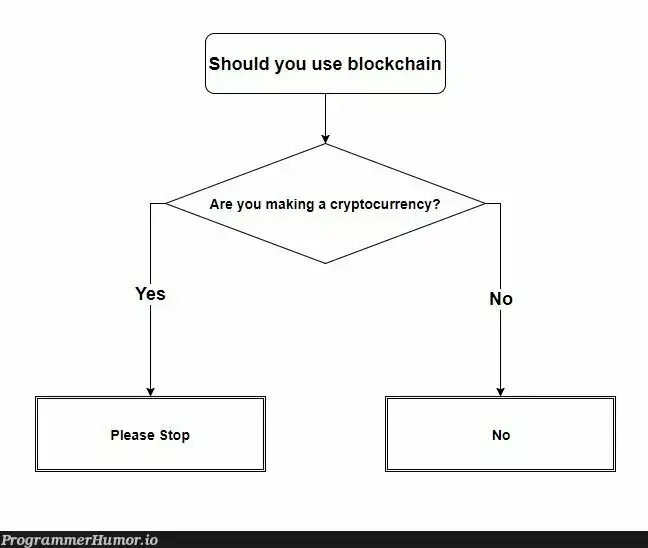Lemmy Shitpost
Welcome to Lemmy Shitpost. Here you can shitpost to your hearts content.
Anything and everything goes. Memes, Jokes, Vents and Banter. Though we still have to comply with lemmy.world instance rules. So behave!
Rules:
1. Be Respectful
Refrain from using harmful language pertaining to a protected characteristic: e.g. race, gender, sexuality, disability or religion.
Refrain from being argumentative when responding or commenting to posts/replies. Personal attacks are not welcome here.
...
2. No Illegal Content
Content that violates the law. Any post/comment found to be in breach of common law will be removed and given to the authorities if required.
That means:
-No promoting violence/threats against any individuals
-No CSA content or Revenge Porn
-No sharing private/personal information (Doxxing)
...
3. No Spam
Posting the same post, no matter the intent is against the rules.
-If you have posted content, please refrain from re-posting said content within this community.
-Do not spam posts with intent to harass, annoy, bully, advertise, scam or harm this community.
-No posting Scams/Advertisements/Phishing Links/IP Grabbers
-No Bots, Bots will be banned from the community.
...
4. No Porn/Explicit
Content
-Do not post explicit content. Lemmy.World is not the instance for NSFW content.
-Do not post Gore or Shock Content.
...
5. No Enciting Harassment,
Brigading, Doxxing or Witch Hunts
-Do not Brigade other Communities
-No calls to action against other communities/users within Lemmy or outside of Lemmy.
-No Witch Hunts against users/communities.
-No content that harasses members within or outside of the community.
...
6. NSFW should be behind NSFW tags.
-Content that is NSFW should be behind NSFW tags.
-Content that might be distressing should be kept behind NSFW tags.
...
If you see content that is a breach of the rules, please flag and report the comment and a moderator will take action where they can.
Also check out:
Partnered Communities:
1.Memes
10.LinuxMemes (Linux themed memes)
Reach out to
All communities included on the sidebar are to be made in compliance with the instance rules. Striker
view the rest of the comments

Could like, 51% of the owners just coordinate to kind of, do a fraud? I mean it sounds like an inherently democratic system, but from what I've understood of, say, miners, right (dunno how this works for proof of stake, but I imagine it has similar problems), those rigs are gonna be bought by people who disproportionately have higher earnings and can afford more GPUs in finland or wherever, and then that's going to just kinda recreate the same power dynamic that we see in the real world already. Which ends up in the same kind of speculative market garbage we have with stock ownership in companies already.
I also don't really understand how a ticketing system would really work on the blockchain. I probably don't know enough about cryptography to know how it might work, but I got the sense that nfts weren't even overpriced jpegs, they were overpriced links with pseudo-legal contracts, that were still prone to link rot, and didn't really indicate any IP ownership. If you had a code on the ticket instead that could only be verified as real, rather than fake, by a ticketing person, instead of like, a link, that would probably be the use case, right? am I getting that correct, is that something cryptography can do? probably, right?
Also, can someone just like, steal your ticket still? Or like impersonate you as the ticket guy, or what? Like from the others have told me and also just from what I know already, you can't really change the chain unless, like you said, you have 51% of the owners, so how would you be able to like, put something in the chain that identifies the owner as being the owner? Wouldn't it be more secure to have just like, a verifiable code or something, that you can delete, that isn't public, between the artist and the buyer? Then you could ensure anonymity between the buyer and the venue and stuff, you could work in establishing characteristics like oh here's my driver's license, here's my government ID, without putting that stuff on the blockchain, which seems like a bad idea.
Sybil attacks sound like the kind of thing you're talking about. I don't have the expertise to go into it, but one person (or a group) creates lots of nodes and uses that influence to do bad things to the network, potentially including fraud. Or as you suggest, legitimate users can just coordinate to do whatever they wanted (see ethereum vs ethereum classic if you want a chuckle).
I want to make a note that the networks are only resilient to a specific type of fraud - people trying to enter data in a way that doesn't meet the criteria of the system. That's all well and good for wallet to wallet transactions, but when you have transactions going off chain (like buying something, trading for other kinds of coins, doing anything with crypto exchanges), there are still plenty of other kinds of fraud that are possible and happen all the time, because while the chain is fairly trustworthy, nothing else about the system is. Most kinds of fraud involve doing things that technically you have permission to do, because you lied to people to access their password or promised them bigger returns in the future or missold a product or service etc and all of that is still possible under crypto. In some cases crypto is more vulnerable to these things because of having no central authority or regulator or laws or whatever.
https://blockworks.co/news/nft-airline-tickets-revolutionize-travel